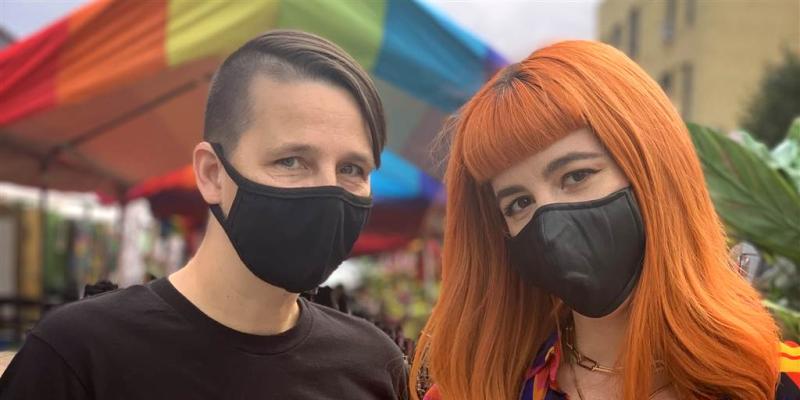Covid is impacting introverts and extroverts very differently. Just ask my wife.



When I explain my relationship dynamic to strangers, I like to tell them about a night a few years ago when my wife and I met up with friends at a crowded bar in Brooklyn, New York City.
I was on the dance floor talking to a friend and straining my voice to be heard over the music when I noticed Lisa standing alone and content against a wall, only bothered when other patrons drew near.
Our friends have joked that Lisa doesn't want to hang out with them because she'd rather be alone; I quip back that she doesn't even want to hang out with me.
Until the pandemic, this dynamic helped define our lives. I scheduled an activity or catch-up with a friend almost every night of the week. When she had free time, Lisa preferred to relax at home, with the exception of date nights.
Our friends have joked that Lisa doesn't want to hang out with them because she'd rather be alone; I quip back that she doesn't even want to hang out with me. The actual truth is that human interaction makes me feel replenished, while she finds time alone to be restorative.
Nine months into the pandemic, and several cycles of our respective coping mechanisms later, I envy her ability to look inward. While our former lives were orchestrated around social, professional and familial pressures that were often out of sync with her introversion, coronavirus has undone many of the ways in which we think of extroverts as having an advantage in our highly social world.
Are you an introvert? Why that's not a bad thing
For extroverts like me, our brain's reward circuitry is activated when we're in a social environment or group and feel the spotlight of attention. Conversely, for introverts like my wife, these situations can be overstimulating, according to Todd Kashdan, a psychologist and co-author of "The Upside of Your Dark Side."
When New York City locked down in March, I went into a digital socialization hyperdrive. There was webcam drag bingo, virtual birthday parties and at-home fitness challenges. But I quickly learned, like many others, that a screen is no replacement for in-person interaction. By May, I'd lost my job and we both got and recovered from Covid-19. I was desperate for the pressure-release valve found in the company of friends. But that valve — one through which I needed to externalize my despair — had been shut off.
Lisa, on the other hand, was coasting along. As a nurse, she still reported into work. She lamented the awfulness of the year, of course, but not much changed in the way of her plans; Lisa was happy on the couch with me, our cats, and Netflix. Her perfect-sized crowd.
As it turns out, the chasm of how we've coped is explained by the hardwiring of our personalities.
Now as the seasons change and coronavirus numbers surge, we're looking at another stretch mirroring last spring, with diminishing options to see friends and family at a safe distance outside. There are still so many reasons for us to feel despair, between the hundreds of thousands of people who have already died from Covid-19 in the U.S., the murders of Black and brown people at the hands of police and a justice system that fails to hold them accountable, and a polarizing and exhausting election that the president has not yet conceded.
Staring into this grim future, it feels like the tables have turned. Not only has the ability to socialize in person been mostly removed, but extroverts like me don't have opportunities for spontaneous interactions, like chatting with a stranger at a bar, bumping into a neighbor in my apartment building or just being around people on a commute to work and in the streets of the city. Meanwhile, introverts who find themselves restored when they're alone may be finding themselves with a greater availability of time to do so.
Popularized by the psychiatrist Carl Jung in the early 1900s, introversion and extroversion represent end points on either side of a continuum. At the time, it was thought that introverts were internally focused on their own thoughts, while extroverts relished the external world.
Since then, we've come to learn there can be a great deal of variance within each of us at any time, as well as ambiverts who fall in the middle of the continuum, according to the psychologists I talked to.
For Fil, 32, and Emma Eden, 29, a married couple living in Rhode Island, the pandemic has similarly underscored these personality differences. Before lockdown, the pair established a routine that gave them equilibrium. If they were going out to a bar with friends, they'd take separate cars so Fil could stay out as late as he wanted and Emma could head home when she hit her limit.
As someone who gets "energy" from socializing, Fil said he's struggling to navigate the mandated alone time, with an added layer of hearing about friends who aren't taking Covid-19 as seriously. "Now I'm just stuck at home and I'm miserable," Fil told me. "But, I also got FOMO because they're all out still kinda doing their normal thing."
Meanwhile, Emma said she doesn't have to be as intentional about scheduling alone time. "I feel less anxious," she said. "Before I would need to kind of plan to recharge after spending a lot of time with people. I don't need to do that, which is pleasant."
While Emma and my wife may be finding unanticipated relief, so much of our pandemic experience as introverts and extroverts comes down to the "nature of [our] lockdown," according to Jonathan Cheek, a professor of psychology at Wellesley College. That means it's not necessarily a breeze for introverts, either.
It sounds intuitive that extroverts would have a harder time during a prolonged interruption in socializing, but introverts who've been forced into unpredictable circumstances — interruptions in planning, encroaching family — can also feel exhaustion, Cheek said.
When the pandemic hit, Eva McCloskey, 40, her boyfriend and their 2-year-old son moved in with McCloskey's family because they needed help with child care. While McCloskey was grateful for the support, the lack of alone time was draining.
"There's just always someone around and so little bits of solo time. It was challenging for me to be as gracious as I felt," McCloskey said. "It was just really hard. [I'd] be annoyed that I was around people all the time."
In a time of political and social unrest, it's especially important for extroverts like me to focus on quality over quantity in our relationships.
Now back in her own apartment and with child care restored, McCloskey said "it feels luxurious" to have her alone time back.
To be clear, when it comes to my own living circumstances, my normal outlet to blow off steam may be cut off, but Lisa and I are still in a position of privilege. When I lost my job, I was able to freelance, so we were never in the kind of precarious financial situation that millions of unemployed Americans are facing. When we witness horrific accounts of police violence, as white people we do not live with the fear that we could be next.
In a time of political and social unrest, it's especially important for extroverts like me to focus on quality over quantity in our relationships. We should surround ourselves with — or limit our digital communication and social distancing to — people who fully accept us. In other words: Make time for people who you can be "effortlessly yourself around," Kashdan said.
As we brace ourselves for more pandemic time indoors, just knowing the root of my depletion is helpful in figuring out how I'm going to get through the winter. I'm planning on nurturing fewer relationships more deeply over digital communication, rather than scheduling a torrent of Zoom calls with acquaintances. I'll be saving that energy for when we can be back at a crowded bar in Brooklyn. Until then, I'll be on the couch with Lisa.
 Alex Berg
Alex Berg
Alex Berg is a freelance journalist and producer. She is the co-Host of the @ImFromDriftwood podcast.

Tags
Who is online
482 visitors

Nothing has changed in this introverts life.
Mine either. I have socially distanced for almost 4 years now. My husband and I did not socialize much thanks to his MS. We did go out to breakfast on Sundays with a few friends and he had a once a month card game. The only thing I miss is not being able to go out for a beer once in awhile and sometimes a game of pool or darts.
I didn't marry until I was 35, so I spent most of my non-working time at home alone, and was happy for it. During lockdown, it was really easy for me - movies to watch, books to read, internet, NT, and because my wife and I are not very conversant in each other's language, it was damn peaceful and I was really comfortable. So I guess I lean towards introversion. I simply do not have a desire to get out among many people, especially crowds.
I'm an introvert. The only thing that's really bothered me about social distancing has been not seeing family as often as I'd like. I have seen them, and am currently staying at my parents' house, but might not get to be here for the holidays.
My posts, convey i'm possibly pre introvert, so, leads me to B leave i'm pervintroverted as my thoughts are often in the Gutter, but, since i actually do own a gutter machine, and spit out any lenght of gutter, and or other that i might mutter, we all might see how this Mutter of a year might catch US All Mutterin sumtin or utter. I'm one who i see as both. From my introverted exterior, i reflect upon my extroverted interior, of leather and laced with pampering poisons to kill the time spent waiting for chronological increments to be chronically lately very early, but who am i kidden Shirley you and all have seen who eye be in the eye of the B holder, Keeper of all the secrets i secretly never told her, but, are omissions the comforter of our emotions when they are omitted so as know offense committed, or a mechanized Armour all of Defense, but without a Minster, to administer the boundaries... for when i have tiny cups of T n T, i administer the mixing via mini stirs, so as to equalize the viscosity blurred behind my eyes, cause sites unseen, aren't always ob, while ones image stolen from a facade aren't always sleet, but i've seen obscener obscenes that precipitated sleet , yet weren't always obsolete...
Extrovert internally for an Introvert projected, could it be i'll project, what ever image i feel would be the image i needed to project...dependent on if it were mine,or anothers', home to wreck , cause hey, what the heck, when i give myself options, i find them optional, when one tries to remove said options, i subliminally can't hear them while removing theirs, but hey, sometimes images do blurs, so i focus on being out of, and it is too damn easy for me, but that's because i'm an X ray of sunshine not shining at/on MRI, but spelled MRE, but that;s just me...ore, who i imagine me to be when refracted light reflects on me
My husband and I are both introverts. We've seen very few people and we like it that way. Even family... while I frequently chatter with family on FB or over the phone / text, we've never spent a lot of time with anyone outside of our household. However, I see it taking a toll on my 12 year old son and my 17 year old daughter (albeit, not to the degree of my son). My son is a social butterfly, but doesn't have any close friends; therefore, struggles with the lack of communication with those his own age. My daughter on the other hand, is somewhere in between... I believe the article called it an ambivert. Her boyfriend lives with us, so that helps her too, but just like any couple, they need breaks from one another. I think for being teenagers, they do rather well with expressing themselves in a healthy manner regarding their own space and their frustrations with one another.
I have no issues with continuing to work from home and limit my space around others. I simply feel bad for my son. We live in a neighborhood where not a lot of kids live; mostly retirees live around us.
I don't know how I would classify myself. I don't necessarily have to talk to people yet I love to be around people.
I can sit on my patio with a beer just as easy as I could sit around others at a party.
I do miss going out and doing things.
I miss eating out. Takeout isn't the same. Only one restaurant delivers where I live.
I'm sure it's obvious that I'm an extrovert.....
As terrible as this pandemic is there is an opportunity for us to reset and reinvent what we want our lives to look like. Less commute, more family time. Traveling curbed, more time working around the house. Restaurants with limited occupancy, more home cooked meals. Theatres closed, bring out the board games or go for a walk. Read a book, take up a language, reorganize or donate old clothes, unwanted furniture, etc....
I don't know how many times I started to learn Spanish then quit.
I wish I would have stuck with it. It would have been easier for me, I think, if I was around people that spoke it.
The best way is immersion, being around people who will have conversations with you in Spanish all the time, or at least as much as possible. Since that is probably difficult to accomplish, you can watch Spanish language television, listen to Spanish lanuage radio and read Spanish language books, magazines and websites. Do it with a Spanish-English/English-Spanish dictionary. I imagine Youtube might be a good source, also. If you do it regularly you might be surprised how much progress you will make. Of course, having people you can speak with in Spanish would help you make the most progress.
As PJ mentioned in the comment below, there might be virtual groups you can join.
Last time I watched a tv series from Spain.
I was starting to get a lot of it. When I quit I tend to forget as well.
You have to be persistent. The more it becomes a regular thing, the more you will remember.
There are virtual groups that you can join and practice with. I joined an asl group a couple years ago when I was traveling so much I couldn't make my classes at the local college. Look into it and see if there's something out there that works for you.
That's one thing I always wanted to learn, ASL. I started learning some and remember what I've learned thus far. Mostly just YouTube videos and watching The Walking Dead... they have a couple deaf women on the show.
I am very introverted and driven to read and research on whatever subject(s) capture my interest in the moment. Sometimes it seems that I have spent the majority of my life not worrying about trying to fit square pegs into round holes, but why either either exists in the first place and whether I can improve upon them.
When it comes to people, I prefer to know a few very well. These tend to be introverts who don't need a lot of attention or praise and really like in-depth meandering discussions. This is why I try to avoid commenting on any article where a moderator steers the conversation in a narrow way.
Because of Tig on this site, I was introduced to Robert Sapolsky's books and UCLA courses about human behavior. I have spent many months reading, watching, and listening to Sapolsky's studies. This led me to researching why we have little or no "freewill". Then, I discovered "You are not so Smart" by David McRaney which further underscores why we lie to ourselves. This research has helped me to weather the pain that I feel watching strangers needlessly die because of their inability to deal rationally with a communicable disease. (Or at least how my brain is wired to view "rational".)
My life has changed very little. I just have had more to research in an attempt to understand the world I inhabit.
A guy whose perspectives on "personality" that I find to be very entertaining in these trouble times recently produced the following video about introverts.
I hope you enjoy.
and which personalities are most like to survive quarantine?